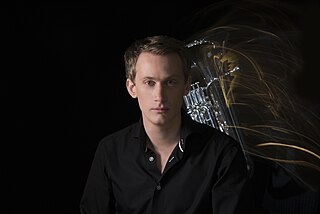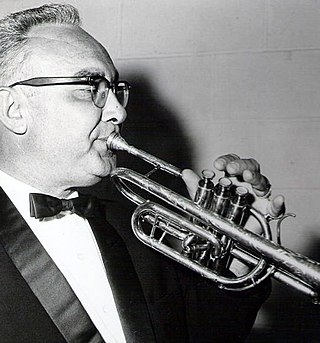Related Research Articles

The cornet is a brass instrument similar to the trumpet but distinguished from it by its conical bore, more compact shape, and mellower tone quality. The most common cornet is a transposing instrument in B♭. There is also a soprano cornet in E♭ and cornets in A and C. All are unrelated to the Renaissance and early Baroque cornett.

The euphonium is a medium-sized, 3 or 4-valve, often compensating, conical-bore, tenor-voiced brass instrument that derives its name from the Ancient Greek word εὔφωνος euphōnos, meaning "well-sounding" or "sweet-voiced". The euphonium is a valved instrument. Nearly all current models have piston valves, though some models with rotary valves do exist.

Buffet Crampon SAS is a French manufacturer of wind instruments based in Mantes-la-Ville, Yvelines department. The company is the world market leader in the production of clarinets of the Boehm system. Its subsidiary, Buffet Crampon Deutschland GmbH, founded in 2010 and based in Markneukirchen, Vogtland, Sachsen, is the world market leader in the manufacture of brass instruments. To manufacture and sell its products, the BC Group employed around 1000 people worldwide at the beginning of 2021, 470 of them as employees of BC Germany alone. The management of the group has been in the hands of Jérôme Perrod since 2014.

The Grimethorpe Colliery Band is a brass band, based in Grimethorpe, South Yorkshire, England. It was formed in 1917, as a leisure activity for the workers at the colliery, by members of the disbanded Cudworth Colliery Band. Along with the Black Dyke Mills Band, the band became the first to perform at the Proms. Grimethorpe Band achieved fame after appearing in the film Brassed Off.
Dudley Bright was appointed Principal Trombone of the London Symphony Orchestra in 2001 and retired from that position in June 2018. Prior to that, he held the same position with the Philharmonia Orchestra and Halle Orchestra and before that briefly as an associate with the LSO. He is also Professor of Trombone at the Royal Academy of Music.

Merri Jean Baptiste Franquin was a French trumpeter, cornetist, and flugelhornist who was professor of trumpet at the Conservatoire de Paris from 1894 until 1925. Franquin was a teacher of Eugène Foveau (1886–1957) who became professor of cornet at the Paris Conservatory in 1925. Georges Mager (1885–1950), who was principal trumpet of the Boston Symphony Orchestra from 1919 until 1950, studied in the cornet class under Joseph Mellet, but seems to have been influenced as well by the teachings of Franquin; Mager may have studied with him informally and certainly worked with several of his successful students. Franquin's collaboration with Romanian composer Georges Enescu (1881–1955) led to the composition in 1906 of Légende, one of the great twentieth-century works for solo trumpet and piano. Franquin's book, Methode Complète de la Trompette Moderne de Cornet a Pistons et de Bugle, has been an influential teaching aid for many trumpet players, notably Maurice André. Franquin's most notable accomplishment while at the Paris Conservatory was his push for the C Trumpet to replace the low F trumpet as a more versatile orchestral instrument. A more modern form of this instrument was introduced to American symphony orchestras by Georges Mager, and it remains very much in popular use in the United States.

Besson is a manufacturer of brass musical instruments. It is owned by Buffet Crampon, which bought Besson in 2006 from The Music Group.

Elgar Howarth, is an English conductor, composer and trumpeter.

Herbert Lincoln Clarke was an American cornetist, feature soloist, bandmaster, and composer. He is considered the most prominent cornetist of his time.
Harry Mortimer was an English composer and conductor who specialised in brass band music, one of the foremost cornet players of his era.

A brass band is a musical ensemble generally consisting primarily of brass instruments, most often with a percussion section. Ensembles that include brass and woodwind instruments can in certain traditions also be termed brass bands, but may be more correctly termed military bands, concert bands, or "brass and reed" bands.

James Gourlay is a Scottish conductor and tubist.
John Maines is a musician, trombone player and active figure in the British brass band movement as a performer, conductor, tutor, compere and concert presenter.

The Antoine Courtois company, founded in Paris in 1789, is a renowned manufacturer of brass musical instruments. The company's name comes from the name of the founder's children who created the brand name in 1803. The company has been a leading manufacturer of brass instruments ever since, particularly trumpet, cornet, saxhorn, flugelhorn and trombone. Today, Antoine Courtois is one of the brand names of Buffet Crampon Group, headed by Antoine Beaussant.
Nigel Clarke is a British composer and musician. He is a former head of composition and contemporary music at the London College of Music and Media.

Robbert Vos, is a euphonium soloist, Besson artist, conductor and tutor from the Netherlands.
Howard Dunster Snell was born in Wollaston, Northamptonshire, England.
Alexis Demailly is a French classical trumpeter and cornetist.

James Francis Burke was an American cornet soloist. He was the principal cornet soloist with the Goldman Band from 1943 to 1974. He was also the principal trumpet with The Baltimore Symphony Orchestra from 1943 to 1949. Mr. Burke, who had the use of only one arm, was considered the greatest virtuoso of his time on the instrument, according to Ainslee Cox, conductor of the Guggenheim Memorial Band.
James Shepherd was an English cornet player from Northumbria, described as one of the world's most respected players of the instrument, having won the Championship Soloist of Great Britain Prize in three consecutive years (1962-4). He was principal cornet of Carlton Main Frickley Colliery Band from 1960 to 1963, then the Black Dyke Band from 1963 to 1973, before forming a brass ensemble, James Shepherd Versatile Brass, which he led until 1989. He was also principal cornet of the Virtuosi Brass Band, a recording ensemble assembled by Eric Ball.
References
- ↑ Reference as one of the world's greatest
- 1 2 Brass Band World Magazine – Issue 111 – pages 5–8 (Information on previous jobs, Queen Victoria's cornet & some further biographical details)
- ↑ Great deal of biographical information
- ↑ It confirms here he is a Doctor
- ↑ Information about Terry Webster being Grimethorpe's manager
- ↑ News from Grimethorpe (bottom of the page is first contest result)
- ↑ Reference for work with Buffet Crampon
- ↑ Reference for rejoining Grimethorpe
- ↑ Some of the many CDs that Webster appears on
- ↑ Review of PPP
- ↑ Classical Favourites for Trumpet information
- ↑ Trumpet Through the Ages information